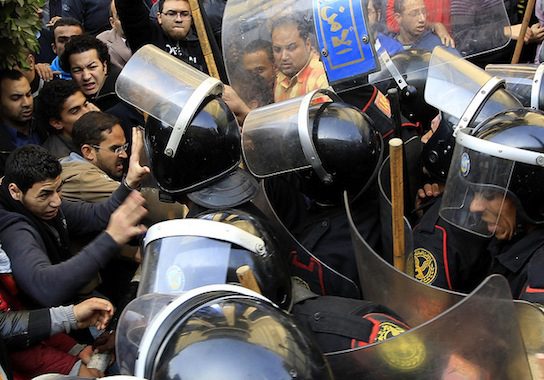In Egypt, Violence Begets Violence

The Egyptian government announced a month-long state of emergency, after the military raided pro-Morsi sit-ins Monday morning. The measures came because of “danger due to deliberate sabotage, and attacks on public and private buildings and the loss of life by extremist groups,” according to the presidential statement.
But Monday’s crackdown resulted in a reported 278 dead, according to Egypt’s Health Ministry; Ashraf Khalil wrote in a dispatch for TIME Magazine that across Cairo, “a much more prolonged and potentially bloody battle is unfolding.” By mid-afternoon, Vice President and Nobel laureate Mohamed ElBaradei announced his resignation. “The social fabric has become threatened with rupture, because violence only begets violence,” he said on Twitter. Informed Comment’s Juan Cole noted that military and Interior Ministry leaders have been divided between using force or a gradual, attrition-based approach to quell the protests. “The military had appeared to wish to treat the Brotherhood members as members of a conspiratorial and manipulative covert organization,” he writes. “They may now have a green light to proceed in that way.”
What implications does this crackdown have for Egyptian politics? TIME’s initial commentary sounded almost hopeful: Khalil wrote, “The storming of the sit-in camps could mark the beginning of a new phase of the Egyptian political crisis. By purging the Brotherhood, the interim government might be able to begin organizing a new transitional roadmap—including scheduling fresh parliamentary and presidential elections.”
But the siege has had detrimental repercussions thus far: clashes are spreading throughout the country. Christian news outlet WORLD Magazine reported that Morsi supporters have set fire to churches in regions outside the capitol, the latest attacks in a swath of intensifying religious violence. Ishak Ibrahim, of the Egyptian Initiative for Personal Rights, told the Wall Street Journal, “We’ve seen attacks like this before, but not of this severity and coordination. These attacks are directly related to the dispersals of sit-ins.” Christians fear the implications of this dispersal — and rightly so: NPR‘s Cairo reporter Leila Fadel commented on the worsening situation Monday:
Violence against Christians in Fayoum very worrying. Many churches burned. Deaths reported. Other clashes across #Egypt
— Leila Fadel (@LeilaFadel) August 14, 2013
John Rossomando called Copts a “favorite target for Muslim Brotherhood supporters and other radical Islamists.” Egyptian Christian Ramez Salama told WORLD, “If you go and hear the speech of hatred they promote against the Christians of Egypt—you can’t imagine,” he said. “It’s all hate speech.” Some commentators fear the crackdowns will merely enflame and bolster protesters’ rage:
Just as Iraq’s violent attack on Sunni Hawija protest empowered violent radicals, I fear #Egypt‘s violent attack on MB sit-ins will do same.
— Kenneth Roth (@KenRoth) August 14, 2013
History will record how #Egypt‘s military rescued the #Ikhwan from imminent failure and instead turned them into heroes and martyrs.
— Khaled Elgindy (@elgindy_) August 14, 2013
Egypt’s citizenry is wedged between a harsh military state and the threat of militant religious radicalism. Protesters, secularists, and minorities will now “choose sides.” Unfortunately, the military’s brutal crackdown has only served to compromise any moral ground it formerly held. The U.S. has been reluctant to withdraw Egyptian aid up to this point; perhaps it is time, as TAC’s Dan Larison said Wednesday, to “cut Egypt loose.”
Comments